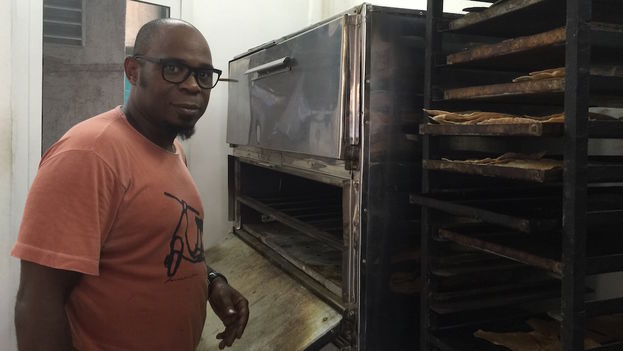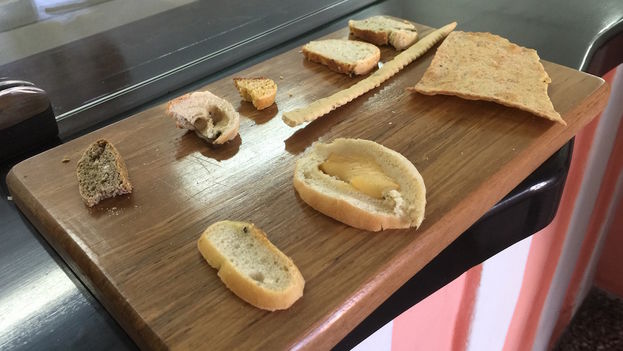
![]() 14ymedio, Yoani Sanchez, Havana, 4 September 2015 — I just wanted to reach Carlos III Avenue. Pass quickly through Infanta Street, avoiding the propped up arcades, to catch a collective taxi and go home. This street, named for royalty, is too woven into the memories of my childhood not to lament every pothole, every sewer leak draining across the sidewalks, every balcony on the point of collapse. However, this week the avenue had a surprise for me, in the shape of a smile and the aroma of bread.
14ymedio, Yoani Sanchez, Havana, 4 September 2015 — I just wanted to reach Carlos III Avenue. Pass quickly through Infanta Street, avoiding the propped up arcades, to catch a collective taxi and go home. This street, named for royalty, is too woven into the memories of my childhood not to lament every pothole, every sewer leak draining across the sidewalks, every balcony on the point of collapse. However, this week the avenue had a surprise for me, in the shape of a smile and the aroma of bread.
Alberto Gonzalez is an entrepreneur, “a little crazy” say those who predicted he would never launch his artisan bakery, much less in a neighborhood where many eat this staple only through their meager portion from the ration market. Determination, stubbornness and a good dose of optimism have combined so that Salchipizza, his private business, is efficient, well run, with varied offerings in the midst of this heir without the right to a throne that is Infanta Street.
Amid the bustle of customers who come to buy, Alberto gave me a moment for this interview about his personal history, the obstacles faced by the self-employed, and his dreams for the future. It comes to 14ymedio readers with the freshness of bread just out of the oven.
Yoani Sanchez. Chemical engineer, specialist in water treatment, and emigrant living in Italy for 14 years. Why did you return to Cuba?
Alberto Gonzalez. For the values we are losing and because of the poor diet on the island. We Cubans eat anything. I think to open a business in a place as central as this, 562 Infanta Street between Valle and Zapata, I can help rescue those values, that culinary tradition that we have always had. A Cuban child today doesn’t know what an apple is, what bread tastes like… they only know what pizza is, or a hamburger.
A Cuban child today doesn’t know what an apple is, what bread tastes like… they only know pizza… a hamburger.
Sanchez. And why did you choose to open a bakery, when you trained as a chef and even achieved a Michelin star?
Gonzalez. I ask myself that question. Why bread? If someone searches the internet for the phrase “breads of Cuba” almost nothing shows up in the results. It is an offense that we don’t have on this island something that identifies us with respect to bread. When bread is identity, union, family.
Sanchez. Anything emotional uniting the flour, the yeast, the oven?
Gonzalez. When my grandmother died in 2011, the last phrase she uttered in life was “this is not bread.” She was in the hospital, very sick with cancer and I returned from Italy to see her at the hospital. She asked me for a piece of bread and I bought her one from one of the Sylvain bakeries. When I gave it to her to try she said, “This is not bread.” Then I ran home to knead her a special one, with her recipe for “whole wheat bread,” but she died before she could eat it. Because of this I told myself, “If I open a business in Cuba it will be to make bread.”
Sanchez. Why locate the bakery in Central Havana, a neighborhood with such precarious material circumstances?
“My biggest dream is to stand in a plaza and cook for thousands of Cubans. Whether in the Plaza of the Revolution with a giant kitchen, or in Infanta Street.”
Gonzalez. If someone wants to do something beautiful, they must start with the most ugly part. The values of the human being that we must rescue first are here. Here, people with a piece of high quality bread can begin to save themselves, to rediscover their values. It is not only about filling a hole of hunger with bread, but it has this personality. You have to eat a bread with dignity.
Sanchez. Is there a touch of madness in the decision to open this business?
Gonzalez. Yes, it’s crazy to go back to the raw ingredients. It is crazy to open a business as small as this, without resources, without knowing where you can find ingredients and having to deal with the amount of culinary ignorance on all sides.
Sanchez. I see on the menu you have cornbread, fine herbs, eggplant, fennel seed cookies and even whole wheat bread. How do you maintain such a range in the midst of the food shortages this country is experiencing?
Gonzalez. I am in the process of repatriation to Cuba and that only allows me periods of ninety days in my own country. After that the current law forces me to leave, so I go to Mexico and bring in many of the seeds, flours for those suffering from celiac disease, whole wheat, in my personal luggage.
Sanchez. What do you most need to bring in from abroad?
Gonzalez. Finocchietto (fennel), a very tasty seed that we put in some cookies.
Sanchez. You have an image here with a photo of Martin Luther King Jr. with his most famous phrase. And the dream of Alberto Gonzalez? What is it?

Gonzalez. My biggest dream is to stand in a plaza and cook for thousands of Cubans. Whether in the Plaza of the Revolution with a giant kitchen, or in Infanta Street. To unite all the cooks in Cuba to make a dish together and to have people come and eat for free.
Sanchez. What would you make in that case?
Gonzalez. A dish that unites Italy and Cuba: cornmeal made with cheese and crab.
Sanchez. What is the main obstacle to private sector development and entrepreneurship in Cuba?
Gonzalez. The raw materials and inspectors. They still haven’t authorized wholesale markets to sell raw materials and they don’t allow self-employed people to import commercial products. There is no stability in the quality of the products. Sometimes the flour is good, other times it’s terrible. So I go to Mexico to bring the “core” and the yeast, which lets me make a higher yield bread than we offer. It I want to maintain my offerings I have to do it this way, because it’s very clear to me that the continuity of the product makes the work excellent.
Those are the major obstacles and also the taxes. For example, I have to pay a large sum—about three thousand Cuban pesos—on electricity for the oven, but I hoped that to pay taxes and be a good contributor, this bill would come with certain benefits, with discounts, but it’s not like that.
Sanchez. Are you licensed for a “bakery”?
“My license is for ‘preparer of light food.’ There is no license for a bakery. So I am always afraid of being told, ‘You can not continue in this occupation’.”
Gonzalez. The license is very general: “preparer of light food,” not something specific to bake and sell bread. There is no a license to own a bakery. So I am always afraid of being told “you cannot continue in this occupation.” I went several times to the National Tax Administration Office (ONAT) to see if they could make any adjustment in the law, but it’s still the same.
Sanchez. This coming October 10 is Salchipizza’s first birthday. What is your assessment of the health of the business?
Gonzalez. I rate it as good, because I have made myself known to people. This coming year I will sell a little more.
Sanchez. A tip for those who want to open a business in Cuba?
Gonzalez. That they think twice: first, “think about it”; two “think about it” … Three, “see if you can open it.”
